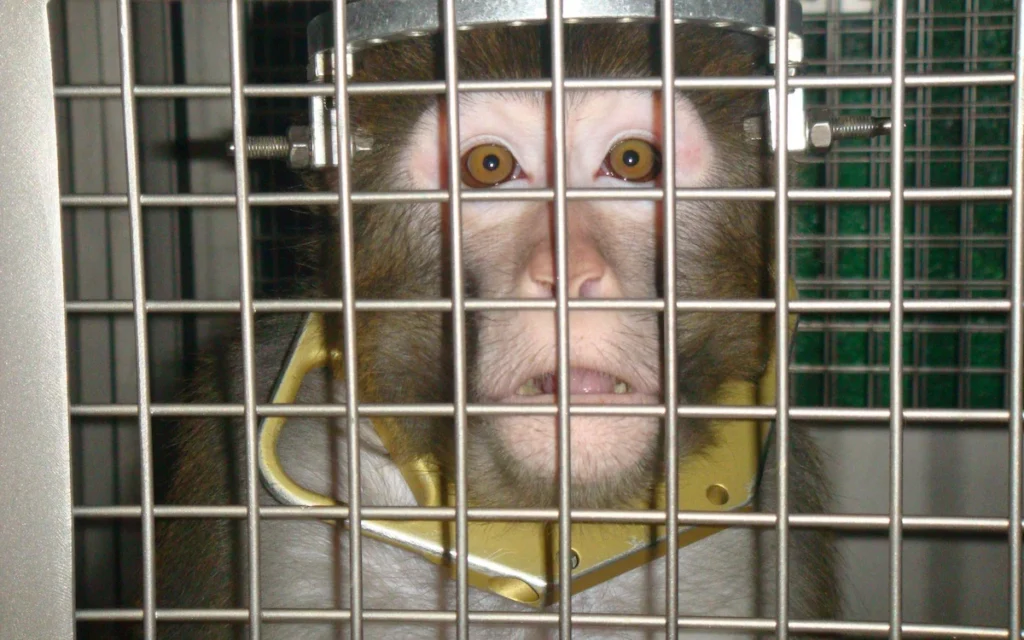Animal Wellness Action and its sister organization urging NIH and FDA to follow with a phaseout of the National Primate Research Centers
WASHINGTON, D.C. — Animal Wellness Action and the Center for a Humane Economy today praised the U.S. Centers for Disease Control and Prevention’s (CDC) directive to phase out invasive monkey testing and research, celebrating a turning point in federal science policy and accelerating the ongoing shift toward more predictive, less expensive human-based research methods.
As reported in Science, the directive is the first time in history a U.S. agency has shuttered its entire in-house primate research program, apart from NIH’s retirement of chimpanzees a decade ago. Animal Wellness Action is working with senior lawmakers on the House Energy and Commerce Committee on a letter to NIH and to FDA to phaseout the use of primates at the National Regional Primate Centers.

“This is a seismic development in the realm of research science,” said Wayne Pacelle, president of Animal Wellness Action and the Center for a Humane Economy. “In May, we urged NIH to begin winding down the National Primate Research Centers because it’s immensely expensive and not predictive of the human condition, especially for drug screening. A top science agency recognizing the massive expense of acquiring and using primates, the poor results for human predictivity, and the moral concerns about the use of these cognitively complex animals is a landmark development.”
The move follows major announcements in April 2025, when both the NIH and FDA unveiled new internal roadmaps to reduce dependence on animal studies and accelerate adoption of New Approach Methodologies (NAMs), including organ-on-chip systems, advanced tissue models, computational toxicology platforms, and AI-enabled disease modeling.
“CDC’s decision shows the future is already here,” said Tamara Drake, director of research and regulatory policy for the Center for a Humane Economy. “Primate models consistently fail to predict human outcomes, especially in infectious-disease and drug-development research. With NIH and FDA already acknowledging this reality in April, the next logical step is to wind down their primate programs — beginning with the massive National Primate Research Centers.”
CDC’s macaque colony — rhesus and pig-tailed macaques housed at the agency’s Atlanta campus — has long been used for HIV, hepatitis, and sexually transmitted disease research. But the work has been criticized for poor predictive value, serious welfare concerns, and the ethical and financial burden of warehousing primates in high-biosecurity facilities.
NIH currently oversees tens of thousands of federally owned nonhuman primates, most housed at the National Primate Research Centers (NPRCs) — institutions repeatedly cited for animal-welfare violations, broken oversight systems, disturbing mortality rates, and decades of scientifically unproductive research. The seven NPRCs receive approximately $100 million a year in base funding from the government, and the high cost and complex ethical considerations of NHP research diverts funding and focus from more scientifically promising and ethically sound alternatives.
“We have examined the issue of NHPs’ use in medical research and testing from several angles, and we conclude that the continued use of primates is wasteful, dead-end, and even a dangerous strategy.” said Dr. Zaher Nahle, chief scientific advisor for the Center for a Humane Economy. “The phaseout of animal testing under the FDA Roadmap is 3-5 years and continuing investment in primate centers and related infrastructures would be a waste of taxpayer dollars and represents an opportunity cost that those billions of dollars could be spent on more reliable research and testing practices.”
“With CDC stepping away from primate research altogether, NIH’s continued investment in massive primate colonies — many of which have failed to deliver translational results — has become scientifically indefensible and fiscally irresponsible,” said Drake. “NIH must not be the last agency clinging to outdated, high-cost, low-yield animal models.”
Advocates also emphasized the urgent need for a federally funded retirement strategy for primates already in government custody, including the animals at CDC, FDA, and the NPRCs.
“CDC has done the right thing,” Pacelle added. “Now NIH and FDA should immediately phaseout new primate breeding and acquisitions and make a deliberate transition to human-relevant methods that actually advance public health. There should be consistency on this question within the federal science agencies.”
Animal Wellness Action and the Center for a Humane Economy will continue engaging federal officials, congressional leaders, scientific experts, and primate-retirement organizations to ensure a responsible, humane transition that prioritizes modern biomedical science.

